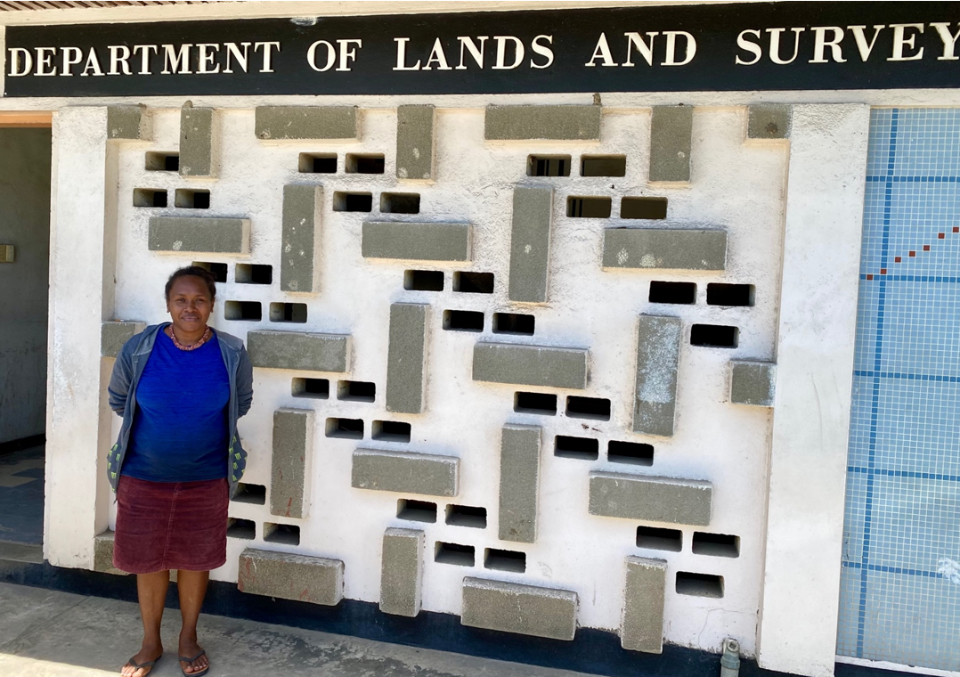In the words of Mary E Tegavota, National Recorder, Land Reform Unit, Ministry of Lands, Housing and Survey, “Only through women’s and girls’ empowerment can we evolve and promote women’s land rights.”
Date:
Women’s empowerment and gender equality are defined as a key priority of the Solomon Islands Government. Ministers in all sectors share the responsibility for ensuring and achieving equal rights with men, especially in the lands sector.
Through its Customary Land Reform Division with support from UN Women and the United Nations Development Project (UNDP) joint UN Peacebuilding Fund Inclusive Governance of Natural Resources Project, the Ministry of Lands, Housing and Survey is mandated to provide policy guidance on how customary land is made equally available and accessible for future development.

Traditional customs are a major part of Solomon Islands' life, including customary land tenure by which matrilineal and patrilineal clans own the majority of the land. Traditional norms influence gender relations in different Solomon Islands cultures regarding labour division, property rights, and decision-making.
Law and human rights were among the most important things in my family, and I clearly knew I would become a lawyer one day. That was just a matter of time.
In 2014, I joined the Ministry of Lands, Housing and Survey as a Chief Legal Officer, advising the Commissioner on legal matters and dealing with code cases. Among the biggest achievements I had at the beginning of my career with the Ministry is developing recommendations for the Land Reform. One of the inputs was to implement the Customary Land Recording in the Solomon Islands. After three years with the Ministry, I was chosen for the role of the National Land Recorder.
Being a woman in the land sector is both challenging and fulfilling. Challenging because you do understand that every time you speak, people, see you as a woman first and then as a professional land recorder. It is fulfilling because you learn a lot through your everyday work. It teaches you to be innovative when dealing with difficult issues.
Inclusive growth requires equal access to opportunities and resources for all society segments, including for both women and men. Regardless of whether a woman lives in a rural or urban setting, land rights also have major implications on her human rights, such as the right to equality and involvement in decision-making processes. Only through women’s and girls’ empowerment can we evolve and promote women’s land rights.
As the first female land recorder, I know it's crucial to pay attention to and empower the next generation. Consulting with women and girls on the Customary Land Recording is an essential part of the Programme as women’s voices usually remain unheard otherwise. I now understand why these preparatory and mentoring sessions with women are so significant today, and my team pays special attention to women’s voices at the consultations we conduct.
Every woman is entitled to active, free and meaningful participation in, contribution to, and enjoyment of civil, economic, social, cultural and political development to realize their land rights. For me, it is an opportunity to ensure that women are equally presented and involved in the customary land consultation process to make the land recording more inclusive of women.
For more information or media inquiries please contact:
Anastasiia Tiurmenko
Communications Specialist, UNDP Solomon Islands Office
Email: [ Click to reveal ] | Tel: +677 27 446/ +677 747 21 29
****
The article is prepared within the Inclusive Governance of Natural Resources (IGNR) project implemented by UNDP Solomon Islands and UN Women Fiji Multi-Country Office, funded by the UN Peacebuilding Fund to support and empower women and youth of Solomon Islands and ensure their participation in the decision-making processes.